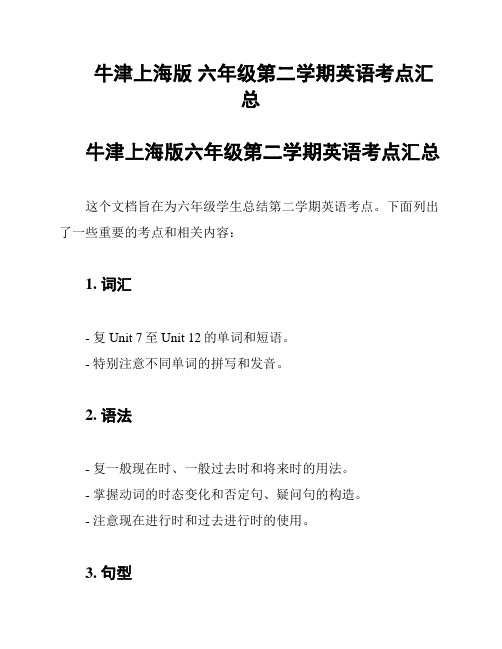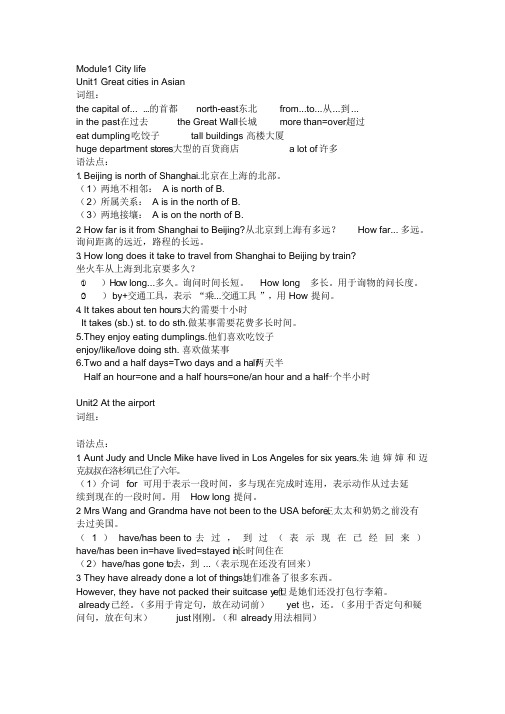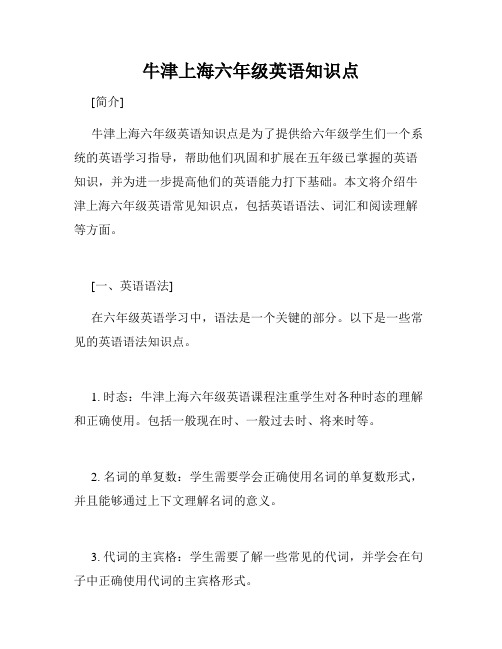上海牛津六年级小学预初)英语知识点整理二)
牛津上海版 六年级第二学期英语考点汇总

牛津上海版六年级第二学期英语考点汇
总
牛津上海版六年级第二学期英语考点汇总
这个文档旨在为六年级学生总结第二学期英语考点。
下面列出了一些重要的考点和相关内容:
1. 词汇
- 复Unit 7至Unit 12的单词和短语。
- 特别注意不同单词的拼写和发音。
2. 语法
- 复一般现在时、一般过去时和将来时的用法。
- 掌握动词的时态变化和否定句、疑问句的构造。
- 注意现在进行时和过去进行时的使用。
3. 句型
- 复基本句型:主语+谓语+宾语。
- 研究一些常用的短语和句型,如“Can you...?"、"I can't..."、"How often do you...?"等。
4. 阅读理解
- 阅读并理解课文中的重要信息和细节。
- 学会根据上下文猜测词义。
- 提高阅读速度和阅读理解能力。
5. 口语表达
- 多参与口语练,提高口语表达能力。
- 学会用英语进行日常交流,包括问候、介绍自己、描述事物等。
6. 听力训练
- 提高听力理解能力,通过听力练来听懂并理解对话和短文。
- 学会根据听到的内容回答问题。
以上是牛津上海版六年级第二学期英语的考点汇总。
希望这份文档对大家备考有所帮助。
祝你们考试顺利!。
上海牛津英语六年级第二学期知识点汇总、六上英语期末卷

六年级第二学期牛津英语知识点梳理Unit ne Great cities in Asia打*的知识点仅供参考知识点梳理:I 词组1. at an exhibition 在展览会上2. the capital of China 中国的首都3. north-east of Shanghai 在上海东北面east/ west/ south / north of 在……的东、西、南、北面north-east /north-west of 在……的东北、西北south-east /south- west of 在……东南,西南* in/on/to the east ofeg. Shanghai is in the east of China.orea is on the east of China.Japan is to the east of China.3. how far 多远4. how 如何/怎样5. how long 多久6. in the past 在过去7. other places 其他城市8. from shanghai to Beijing 从上海到北京9. read some information about Beijing 阅读关于北京的信息10. the Great all 长城* the Summer Palace 颐和园* the Palace useum 故宫博物院11. more than= over 超过* less than = under 少于12. 15 million people 一千五百万人*millions of, thousands of13. huge department store 大型百货公司*huge= very big14. spicy food 辣的食物15. in Asia 在亚洲16. great cities= big cities 大城市17. which city 哪个城市18. by plane=by air; 乘飞机by ship=by sea; 乘船by train/ ferry 乘火车/ 渡轮19. That’s right. 对的。
(完整版)沪教版牛津英语六年级基础语法复习整理

(完整版)沪教版牛津英语六年级基础语法复习整理形容词比较级最高级<一>规则变化A. 单音节和不可拆双音节形容词1.以e结尾+r / sthuge-huger/hugestlarge- larger- largestsafe- safer- safest2.辅音字母+y结尾:去y + ier / iestheavy-heavier-heaviestdirty- dirtier- dirtiesthappy-happier-happiestearly-earlier-earliestfriendly-friendlier-friendliestangry-angrier-angriesthealthy-healthier-healthiesteasy-easier-easiest3.重读闭音节,以一个元音字母加一个辅音字母结尾:双写辅音字母+ er,est big-bigger- biggestfat- fatter- fattestthin- thinner- thinnesthot- hotter- hottestwet- wetter- wettestred- redder- reddest4.直接+ er/eststrong young old short clever newgreattallhighcheappoorrichsmallslowfastlightB. 部分双音节形容词, 多音节形容词famous- more famous- the most famousmodern – more modern – the most moderncareful- more careful- the most carefulbeautiful-more beautiful-the most beautifulexpensive –more expensive (less expensive)- the most expensive interesting- more interesting- the most interesting<二>不规则变化good/well-better –best bad/badly/ill-worse-worst little-less-least + u. n. (few-fewer-fewest) + c. n.many/much-more –most far-farther-farthest(距离)far-further-furthest (程度)<三>程度副词much 用来修饰形容词比较级cheap (便宜的),cheaper (更便宜)much cheaper (便宜得多), good better much better much faster much tallermuch more beautifulfast faster tall tallerbeautifulmore beautiful<四>too, very, quite, so, as …as ,not as /so …as, less …修饰形容词原级very/quite tall (很高),too tall (太高)so tall (如此高)as tall as(与某人一样高)not as tall as /not so tall as (不如某人高)= less tall 注意事项:1、形容词最高级前必须加the ;副词最高级前可加the ,也可不加thee.g. the biggest cities ;draw (the) best 2、much 可修饰比较级:……得多e.g. much taller ……高得多3、原级标志:very 非常;too 太;quite 相当;(not )as+原级+as (不)像……一样;less+原级不如……;so 如此(共五个)时态填空(一) 常用固定词组:A型. doinglike doing/ love doing/ enjoy doing 喜欢做某事hate doing 讨厌做某事finish doing 完成做某事practise doing练习作某事start doing / begin doing开始做某事What about doing…? / How about doing…? 做某事怎么样?be good at doing善于做某事be poor at doing不善于做某事Sb. spend(s) some time doing sth. 某人花时间做某事remember doing记住做过某事forget doing忘记做过某事see sb. doing看见某人正在做by doing通过做某事by not doing通过不做某事stop doing停止做某事instead of doing而不是做某事go doingB型. to dowould like to do / want to do想要做某事forget to do忘记要做某事remember to do 记得要做某事have/has to do不得不做某事had to do不得不做某事will have to do将不得不做某事plan to do计划做某事One's job is / was to do... 某人的工作是做某事like to do/love to do喜欢做某事start to do / begin to do开始做某事need to do需要做某事don’tneed to do/ don’t haveto do不需要做某事learn to do学习做某事promise to do / promise not to do保证做某事/保证不做某事tell sb. to do / tell sb. not to do 告诉某人做某事/告诉某人不做某事ask sb. to do / ask sb. not to do 叫某人做某事/叫某人不做某事It takes/took sb. some time to do sth.某人花时间做某事It’s timeto do sth. 做某事的时间到了C型. doLet sb. do让某人做help sb. (to) do帮助某人做Why not do...? 为何不做......?would rather do / would rather not do 宁愿做/宁愿不做had better do / had better not do最好做/最好不做may do可以做must do必须做will do 将要做would do想要做shall do 应该做should do应该做can't do不能做may not do 不可以做mustn't do不准做won't do将不做wouldn't do将不做shan't do将不做shouldn't do 不应该做do 不需要做needn’t(二) 五种常见时态:现在进行时公式:am/is/are +doing (现在分词)时间状语:now 现在listen 听look 看these days 最近eg.Look, they are planting trees.一般现在时(助动词do/does)公式:V. / V.+s/es/ies (动词原形或动词第三人称单数)时间状语:always 一直usually 经常often 常常sometimes 有时候once a week 每周一次four times a day 一天四次every year 每年How often 多久一次e.g.I usually take an underground to school.He often takes a bus home.一般过去时(助动词did)公式:V. +d/ed/ied或不规则(动词过去式)yesterday 昨天yesterday evening 昨天晚上ten years ago 十年前last week 上个星期in the past 在过去just now 刚才e.g.Ten years ago, he moved to Japan.I sent a letter just now.4. 一般将来时(助动词will/shall)公式:am/is/are going to +V. , will /shall +V. 时间状语:tomorrow 明天next week 下个星期this weekend 这个星期in the future 在将来Soon 很快,不久在15年后in 15 years’ timeHow soon 多久以后e.g.I will fly to America tomorrow.现在完成时(助动词have/has)公式:have/has +done (过去分词)时间状语:already 已经yet 尚never 从未ever 曾经just 刚才once 一次before 在......之前for 6 years 6年how long 多久e.g.I haven’t read this newspaper yet. Mary has already packed her things.。
牛津英语(上海版)6年级上学期知识点罗列(2)

牛津英语(上海版)6年级上学期知识点罗列(2)1. 表示提出建议的六种说法What about doing sth.?How about doing sth.?Let’s do sth.Shall we do sth.?Why not do sth.?Why don’t you do sth.?2. secretary n. 秘书Susan is a secretary in that company.3. bank n. 银行,河岸Why is the river so rich? Because the river has got two banks.school n. 学校,鱼群Why are the fish so clever? Because they are staying in school.Bank of China 中国银行Construction Bank of China 中国建设银行4. pilot n. 飞行员astronaut n. 宇航员5. person n. 人person 的复数形式是people当people 表示“民族”时,后面可以加s表示复数形式。
There are 56 peoples in China.6. interview v. 采访Tomorrow, I will interview Jay Chou at the concert.n. 面试I have got an interview for a new job tomorrow.interviewer 采访者,面试官interviewee 受访者,应聘者7. find out查明,弄清楚Please find out when the ship starts for New York.find 找到,偶然发现,发觉I found a wallet on my way home.8. if conj. (连词)是否Ask if he plans to come to the meeting.I don’t know if Fiona is listening carefully.9. finish v. 结束, 完成finish doing sth. 结束做某事Have you finished your homework?Have you finished doing your homework?finish with 用完,用好,做好Have you finished with that book? 你那本书看完了么?10. age n. 年龄How old are you? = What’s your age?11. cook v. 煮饭n. 厨师cooker n. 厨具12. would like to be 想要成为= want to beI would like to be/ want to be a scientist in the future.13. like doing sth. 长久性的喜欢做某事like to do sth. 突发性的想要做某事I like swimming but I d on’t like to swim right now, because it is so cold.14. make sick people better 让病人好起来make the city a safe place 让城市成为一个安全的地方1. Tonight is going to be a good night.Tonight will be a good night.There is going to be a meeting tomorrow night.There will be a meeting tomorrow night.2. 频度副词always, usually, often, sometimes, seldom, never频度副词的位置:放在行为动词之前,be动词之后I sometimes watch TV with my grandmother.He is always late for school.3. other 其他的,另外的the other 其他的,另外的。
沪教牛津版六年级(预初)下册英语知识点归纳

Module1 City lifeUnit1 Great cities in Asian词组:the capital of... ...的首都north-east东北from...to...从...到...in the past在过去the Great Wall长城more than=over超过eat dumpling 吃饺子tall buildings 高楼大厦huge department stores大型的百货商店 a lot of 许多语法点:1.Beijing is north of Shanghai.北京在上海的北部。
(1)两地不相邻: A is north of B.(2)所属关系:A is in the north of B.(3)两地接壤:A is on the north of B.2.How far is it from Shanghai to Beijing?从北京到上海有多远?How far... 多远。
询问距离的远近,路程的长远。
3.How long does it take to travel from Shanghai to Beijing by train?坐火车从上海到北京要多久?(1))How long...多久。
询问时间长短。
How long 多长。
用于询物的问长度。
(2))by+交通工具,表示“乘...交通工具”,用How 提问。
4.It takes about ten hours大.约需要十小时It takes (sb.) st. to do sth.做某事需要花费多长时间。
5.They enjoy eating dumplings.他们喜欢吃饺子enjoy/like/love doing sth. 喜欢做某事6.Two and a half days=Two days and a hal两f 天半Half an hour=one and a half hours=one/an hour and a ha一l f 个半小时Unit2 At the airport词组:语法点:1.Aunt Judy and Uncle Mike have lived in Los Angeles for six years.朱迪婶婶和迈克叔叔在洛杉矶已住了六年。
牛津上海六年级英语知识点

牛津上海六年级英语知识点[简介]牛津上海六年级英语知识点是为了提供给六年级学生们一个系统的英语学习指导,帮助他们巩固和扩展在五年级已掌握的英语知识,并为进一步提高他们的英语能力打下基础。
本文将介绍牛津上海六年级英语常见知识点,包括英语语法、词汇和阅读理解等方面。
[一、英语语法]在六年级英语学习中,语法是一个关键的部分。
以下是一些常见的英语语法知识点。
1. 时态:牛津上海六年级英语课程注重学生对各种时态的理解和正确使用。
包括一般现在时、一般过去时、将来时等。
2. 名词的单复数:学生需要学会正确使用名词的单复数形式,并且能够通过上下文理解名词的意义。
3. 代词的主宾格:学生需要了解一些常见的代词,并学会在句子中正确使用代词的主宾格形式。
4. 形容词和副词的比较级和最高级:学生需要学习形容词和副词的比较级和最高级形式,并能够正确运用于句子中。
5. 动词的不定式和动名词:学生需要学会区分动词的不定式和动名词形式,并且能够根据上下文理解其使用方式。
[二、英语词汇]在六年级英语学习中,词汇的掌握是非常重要的。
以下是一些常见的英语词汇知识点。
1. 基础词汇:学生需要熟练掌握一些常见的英语单词,包括表示人物、动物、食物等方面的词汇。
2. 时钟时间:学生需要学会用英语表达时间,并且能够读懂时钟上的时间。
3. 季节和月份:学生需要学会用英语表达四季和十二个月份,并且能够通过上下文理解相关的词汇。
4. 数字和计数:学生需要学会用英语表达数字,并且能够正确计数。
5. 学科词汇:学生需要学会一些与学科相关的词汇,比如数学、科学、地理等。
[三、阅读理解]在六年级英语学习中,阅读理解是培养学生阅读能力和理解能力的重要环节。
以下是一些常见的阅读理解知识点。
1. 阅读短文:学生需要学会阅读简短的英语短文,并且能够通过阅读内容回答问题。
2. 理解问题:学生需要根据短文内容,理解问题的意思,并能够准确回答问题。
3. 推理判断:学生需要通过上下文理解短文中的隐含信息,并能够进行推理判断。
沪教牛津版六年级知识点归纳

六上Module 1-Getting to know each other教学目的:1.学会在详细语境中运用新单词。
2驾驭某些动词过去式的用法。
3.学会用过去时态表述状态。
4.学会用过去时态表述做的事。
5.驾驭写信的格式。
6.稳固情态动词 can、should用法。
重点词汇: ① mouth cute pretty handsome catch② famous during spend everyone countryside③ healthy unhealthy Hamburgyesterday sandwich vegetablechicken chocolate重点句型:1. I/He/She was...You/We/ They were...2.-How was your summer holiday?-It was/was not ...3.- What did you have for breakfast/ lunch/ dinneryesterday?- I had some...语音发音:e e-e ee ea i y e a eaP b t d k c ck gModule 2-Relationship教学目的:1.学会在详细语境中运用新单词。
2驾驭某些动词过去式的用法。
3.学会用一般过去时的疑问句。
4.稳固wh - questions 在过去语态中的用法。
5.驾驭数词 hundred,thousand的用法。
6.稳固 Would like to...句型和 There be ...句型。
重点词汇: ① neighbour son daughter noisy dig② thousand hundred wild way die learn send③ e-friend country other hobby重点句型:1. - Did you +动词原形+过去时间?- Yes,I did./ No,I didn’t.2.There was a...in the past.There were many...in the past.3.-Would you like to ...-Yes,I’d like to./No, I wouldn’t.语音发音 a ar u o ue u-e oo uf v thModule 3-Out and about教学目的:1.学会在详细语境中运用新单词。
牛津上海版英语六年级上教材梳理及练习 Unit2

Unit2一、词汇Words1. almost adv.(1)几乎【例句】Dinner is almost ready.(2)实际上,简直(用于no, nobody, none, nothing, never 之前)【例句】Almost no one believed him.【辨析】almost / nearly相同点:“几乎,将近,差不多”,当于动词、副词、形容词及名词连用时,意义接近,可互换。
【例句】It's nearly lunchtime.= It's almost lunchtime.2. never adv. 从不; always adv. 总是,一直【例句】She is always friendly and helpful.She always works hard.She is never late for school.She never gets angry.注意always 和never在句中的位置,它们都是副词常用于be动词之后、行为动词之前。
3. each other 互相,彼此【例句】Mary and Kitty always help each other.【常见词组】learn from each other 互相学习know each other 互相认识help each other 互相帮助【知识链接】each other 仅用作动词或介词的宾语,不可做主语。
【用法提示】each other 用于两者,one another 用于三者或三者以上。
each other one another(选词填空)I help you. You help me. We help __________.They three sat side by side and talked with ___________.4. friendly adj. 友好的【用法提示】friendly 常与介词to 和with 搭配构成词组1)be friendly to sb.“ ... 对某人友好”或“ 对某人友善”,指对别人的态度友好,相当于be kind to sb. 【例句】Our English teacher is friendly to us.=Our English teacher is kind to us.2)be friendly with sb. “ 和某人关系友好” 或“ 与某人要好”, 指的是两者的关系。
- 1、下载文档前请自行甄别文档内容的完整性,平台不提供额外的编辑、内容补充、找答案等附加服务。
- 2、"仅部分预览"的文档,不可在线预览部分如存在完整性等问题,可反馈申请退款(可完整预览的文档不适用该条件!)。
- 3、如文档侵犯您的权益,请联系客服反馈,我们会尽快为您处理(人工客服工作时间:9:00-18:30)。
Module 1 Family and Friends
Unit 1 I have a good friend
一、词汇及短语
1.almost adv.几乎
e.g. Dinner is my almost ready. 晚饭差不多准备好了。
2.never adv.从不
3.other pron.另外,其他;(两个中的)另一个;其余的,剩下的
常用短语:each other互相,彼此(只能做宾语,不能做主语)
e.g. Mary and Kitty always help each other. 玛丽和凯蒂总是互相帮助。
other…th an…不同于;除了
e.g. You will have time to visit other places than those. 除了那些以外你还能有时间参
观一些其他地方。
Other woman than Sally would have said nothing. 除了萨莉以外,别人什么也没说。
rather than 而不是
e.g. Passions are inflamed r ather than cooled. 激情被点燃而不是冷却.
4.friendly n.有好的;亲切的
常用短语:
5.kind adj.友好的;宽容的n.种类,本质、性质
常用短语:be kind to sb. …对某人有好,友善
all kinds of 各种各样的
6.naughty adj.淘气的
7.lie n.谎言(现在分词lying)v.说谎(过去式lied,过去分词lied);躺,平卧(过去
式lay,过去分词lain);位于
8.ocean n.海洋
世界四大洋(从大到小):
Pacific ocean太平洋Atlantic ocean 大西洋Indian ocean 印度洋Arctic ocean北冰洋
9.just n.刚刚;仅仅
e.g. I have just been to London. 我刚刚去过伦敦。
He was just a child. 他只是一个孩子。
10.Earth n.地球
常见短语:on (the)Earth在地球上
on earth到底怎样,究竟
e.g. What on earth are you doing? 你到底在干什么?
How on earth did she manage that? 她究竟怎么办到的?
11.Look after照顾,照料
look其他常见短语:
look ahead 向前看,着眼未来look at 看着
look around/about 四处看看,四下环顾look back 回头看;回顾
look into向...的里面看, 窥视look for 寻找
look like 看来像look out向外望,注意, 当心, 小心
12.environment n.环境
13.pollute v.污染
pollution n.污染
常用短语:
air pollution大气污染land pollution土地污染water pollution水污染
ocean pollution海洋污染noise pollution 噪音污染stream pollution河流污染
nd n.陆地,大陆v.使…着陆;登岸,着陆
15.keep v.保持n.生活费,生活必需品
常用短语:
keep away from sb./sth. 不接近某人/物
keep an eye on注意,看守
keep on doing sth 保持/不停做某事
keep out留在外面,不进入
16.pick up
(1)捡起,拾起(pick sth up= pick up sth,但是当对象是it/them等代词时,只能是pick it/them up,没有pick up it/them这种表达)
(2)好转,改善e.g. Her health soon picked up after a few day’s rest. 休息了几天后,她的身体很快康复了。
(3)重新开始,继续e.g. We’ll pick up where we finished yesterday. 我们从昨天停止的地方继续进行。
(4)用汽车搭载某人;接(某人)e.g. I wil l pick you up at 7 o’clock. 7点钟我开车来接你。
17.into 到…里面
18.rubbish n.垃圾,废物(近义词:litter,garbage);无聊的想法
rubbish bin 垃圾箱
19.leave v.
(1)留下e.g. Someone left this note for you. 有人给你留下这张便条。
leave sth for sb He left me a few books. 他留给我几本书。
leave sb sth
(2)落下,忘拿,未带e.g. I‘ve left my gloves on the bus. 我把手套落在公共汽车上来。
(3)离开
20.promise v.承诺,保证n.承诺,诺言
常用短语:
make a promise答应,许诺keep one’s promise遵守诺言
break one’s promise违背诺言
21.discuss v.讨论
22.reuse v.再利用
23.work hard 勤奋学习
24.be late for 迟到
25.tell lies 说谎
26.for the first time 第一次
27.shopping bag 购物袋
28.Friend of the Earth 地球之友
二、句子
1.Winnie is visiting Garden City for the first time. 温妮第一次来到花园城。
2.Have you ever been to Ocean Park yet? 你去过海洋公园吗?
(have been to“去过某个地方”)
3.What do you like about her?你觉得她怎么样?
= What do you think of her?= How do you like her?
4.What about Water World?水世界怎么样?
What about=How about “…怎么样?”
5.But she doesn’t talk at all. 但是她什么也不说。
not…at all “一点也不”
(She doesn’t like red at all. 她一点也不喜欢红色)
6.They always walk to school together. 她们总是一起步行去学校。
7.She is never late for school. She never gets angry. 她从不迟到,从不生气。
(be late for 迟到)
8.She is always kind to others. 她总是对人很友好。
(be kind to sb)
9.I promise to keep our school clean. 我保证保持学校清洁。
三、语法
1.sometimes、sometime、some time、some times的区别
sometimes 有时
sometime 指某个不确定的时间,经常与将来时连用,也可和过去时放在一起
some time指一段时间,常与介词for连用
some times指几次或几倍
2.present perfect tense现在完成时
(1)现在完成时的基本构成:has/have+过去分词
否定:has/have+not+过去分词
一般疑问句:Have/Has+主语+过去分词…?——Yes,主语+ have/has. No,主语+ have/has + not.
特殊疑问句:疑问词(What/Where等)+have/has+主语+过去分词…?
(2)现在完成时的使用条件:
现在完成时表示一个过去发生的动作在过去已经完成,并且这个动作对现在仍有影响或结果。
常与already,yet,just now刚刚,since+时间,before+时间等连用。
(3)标志词
already已经
用在肯定句中,表示现在或过去某时已经发生的事实。
yet
放在否定句和一般疑问句句末,与already都是用来表示到某时或者某时前可能已经完成的动作。
例如:I have already finished the work.我已经完成这项工作了。
改为否定句:I haven't finished the work yet.我还没有完成这项工作。
改为一般疑问句:Have you finished the work yet.
(4)与一般过去式的区别
两者所表示的动作都发生在过去,但现在完成时强调这一动作与现在的关系,对现在产生了影响。
一般过去式只表示过去的事实,不表示与现在的关系。
e.g.
Have ever been to Ocean Park? 你去过海洋公园吗?
Yes, I have. 是的,我去过。
When did you go there? 你什么时候去那儿的?
I went there last Friday. 我上周五去的。
